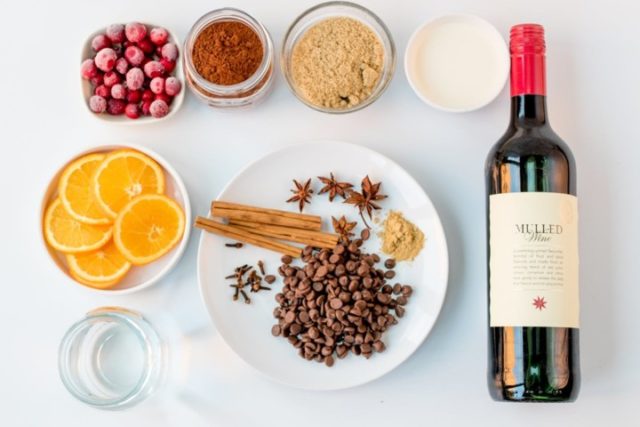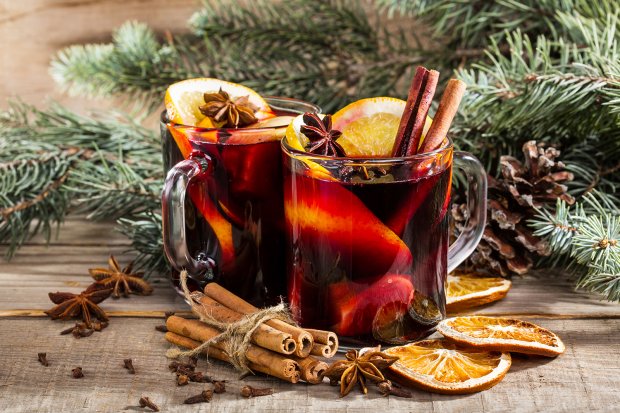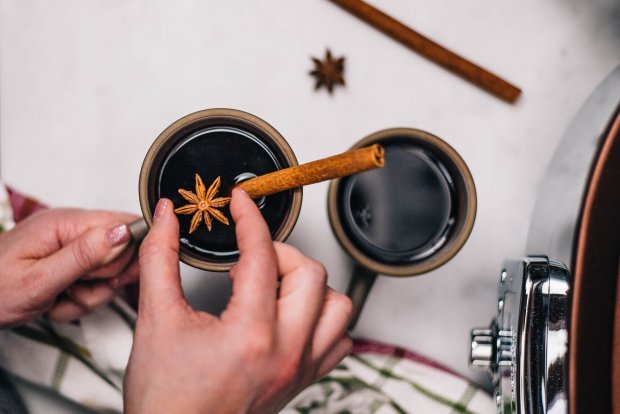Content
The benefits and harms of mulled wine for the body have been known for a long time. Most often, an alcoholic drink is consumed in the winter to warm up and fight the first signs of colds. For children and pregnant women, you can prepare a non-alcoholic version that has the same healing properties.
The chemical composition of mulled wine
Due to its rich chemical composition, mulled wine has a beneficial effect on the body. The drink contains:
- potassium;
- beta carotene;
- calcium;
- B vitamins;
- silicon;
- magnesium;
- ascorbic acid;
- sodium;
- phosphorus;
- chlorine;
- iron;
- vitamins A, D, E, H, K, PP;
- iodine;
- cobalt;
- manganese;
- copper;
- selenium;
- fluorine;
- zinc.

Types of mulled wine
There is a stereotype that mulled wine is wine with the addition of only cloves and cinnamon, heated to 70 ° C. In fact, besides this classic cooking option, there are many flavorful recipes.
The most popular types of mulled wine:
- Fruit... Suitable for lovers of rich flavors. You can prepare a drink based on compote, fruit drink or juice. Any fresh berries and fruits are also added. All citrus fruits, apples, raspberries, currants, pears, strawberries, cranberries, cherries are ideal.
- Curative... This option will help warm up after severe hypothermia, overcome the first symptoms of a cold and get rid of a cough. It is prepared on the basis of wine (alcoholic) or juice (non-alcoholic) with the addition of herbs and spices.
- Non-alcoholic... Even children can benefit from making a drink based on pomegranate, apple-grape or any other juice. Herbal infusions with the addition of spices and honey are also used. Mulled wine made with lemonade with ginger and honey brings significant benefits. Also, any tea is used as a base, adding traditional spices.
Why mulled wine is useful
It is important to remember that the drink has beneficial properties on the body only with moderate use. The maximum allowable volume per day is two glasses.
The healing properties of mulled wine prepared with red wine:
- strengthens the immune system due to the fact that it contains a lot of vitamins, trace elements, amino acids with antiseptic properties;
- the drink invigorates, saturates the body with energy, tones up, charges with optimism for a long time;
- improves the work of the cardiovascular system;
- restores strength, therefore it is recommended to use it after viral diseases;
- destroys streptococcal infection that causes pharyngitis, sore throat and caries;
- antioxidants found in wine help in the treatment of Alzheimer's disease and reduce the risk of stroke;
- prevents the formation of blood clots, increases the diameter of blood vessels;
- reduces the possibility of kidney stones;
- helps to fall asleep faster - just drink 1 tbsp. fragrant drink before bedtime.
The benefits of mulled wine are irreplaceable for colds. It has long been considered the best remedy against the first manifestations of a viral disease. It is an excellent helper in the fight against bronchitis, influenza and pneumonia.
Benefits are brought not only by red wine, which is part of mulled wine, but also by spices:
- cinnamon helps to improve mood and lower blood cholesterol levels;
- cloves, which contain a large amount of vitamin B, have a beneficial effect on the nervous system and relieve irritation;
- cardamom has a beneficial effect on the digestive system. Also acts as a natural antioxidant, which is beneficial for the immune system;
- raisins help to influence the aging gene;
- black chokeberry and lemon added to the composition significantly raise the level of vitamin C;
- ginger warms and tones the body.

Mulled wine harm
Mulled wine has health benefits, but it's worth remembering that a hot drink will intoxicate much faster than a cold one. In addition, not everyone can use it.
The spices that make up mulled wine contain active substances that, if used excessively, disrupt the digestive tract and cause various pathologies. Large doses of hot wine can trigger headaches.
How many calories are in mulled wine
The calorie content of the alcoholic and non-alcoholic options is slightly different. Mulled wine has a high energy value, so it should not be consumed by dieters after lunch and before bed.
Calorie content of alcoholic mulled wine
The calorie content of red wine mulled wine prepared according to the classic recipe is 136 kcal per 100 g. In terms of nutritional properties, it can be compared with many flour dishes and desserts.
Calorie content of non-alcoholic mulled wine
A soft drink made from juice with added fruits and spices is 113 kcal per 100 g. If sugar is present, this figure will be higher.
Contraindications to mulled wine
It is forbidden to consume an alcoholic drink:
- lactating women;
- children under 18;
- insulin-dependent diabetics;
- pregnant women;
- people driving a vehicle.
Do not drink to persons with individual intolerance to any component that is part of.
How to make mulled wine
For mulled wine, you must purchase a dry or semi-dry wine variety. By standards, the minimum alcohol content should be 7% rpm. The drink recipe can be with or without water.
Most often they are prepared on the basis of wine with added sugar and spices. Use:
- lemon;
- cloves;
- anise;
- honey;
- ginger;
- cinnamon;
- black and allspice;
- bay leaves;
- cardamom.
To improve the taste, nuts, raisins and apples are added.
The flow temperature plays an important role. It is forbidden to bring mulled wine to a boil, otherwise its taste will be spoiled. It is necessary to remove the product from the hob while it is hot, but the temperature should not exceed 70 ° C. It is recommended to heat wine in a refractory container, excluding a metal one. In order not to miss the right moment, it is better to cook mulled wine over low heat. It will take longer, but the result will be perfect.
For those who do not like strong drinks, you can dilute the wine with water. Cooking process:
- Boil 180 ml of water. Pour in the desired spices. Cook until the aroma of essential oils begins to spread throughout the room.
- Add sugar, which can be replaced with honey if desired. Mix.
- Pour in 1 liter of wine. Warm up to 70 ° C.
To prepare a non-alcoholic option, you will need:
- Stir in 2 g cardamom, 5 clove inflorescences, 1 g nutmeg, 2 star anise stars, 2 g cinnamon and half a small ginger root, which was previously cut into circles.
- Combine 1 liter of grape juice and 250 ml of orange juice.
- Put on low heat and hold until small bubbles form first. Remove from stove.
- Add spice mixture. Mix. Insist a quarter of an hour.
- Add a few lemon or apple slices. Sweeten with honey or sugar.
It is customary to serve in a tall glass with thick walls and a large handle or in a ceramic mug.

Rules for the use of mulled wine
To speed up the process, you can buy ready-made mixtures for mulled wine, but it is better to purchase all the ingredients separately. In this case, the taste and aroma will be much more pleasant and richer. Drinking rules for alcoholic and non-alcoholic options are the same. Drink gently, slowly, without taking large sips. First you need to inhale the hot vapors, and after that, with a slight sip, enjoy the depth of taste.
The serving temperature should be around 70 ° C. You can keep the drink hot with a thermos, pouring it into a container in a strained form. If you leave citrus slices for a long time, then mulled wine will acquire an unpleasant bitterness.
You can store the drink in a thermos for no more than 2 hours. After that, its taste will change significantly.
Is mulled wine possible during pregnancy
There is a misconception that half a glass of quality red wine will not harm the fruit. But before you drink an alcoholic drink, you need to think carefully. Mulled wine will bring fleeting pleasure, and the consequences can become irreversible: from the development of pathologies in a child to congenital deformity.
An alternative can be a non-alcoholic cooking option, which in moderation (no more than one glass) can be consumed during pregnancy. In this case, you should not add a lot of spices.
In early pregnancy, cinnamon should not be added to a soft drink, as it stimulates uterine contraction, which can lead to miscarriage.
Wine-based mulled wine while breastfeeding is strictly prohibited, as alcohol passes into milk. A drink prepared on the basis of fruit drink, juice, tea or water can be introduced into the diet no earlier than three months after childbirth. The first portion should not exceed 50-100 ml. After drinking, you should pay attention to the condition of the baby, since spices, honey and juices can cause allergic reactions.
Conclusion
The benefits and harms of mulled wine for the body have been fully studied, so it is very popular in different countries. A great alternative to the classic version is a soft drink that is suitable for children and pregnant women.
The benefits and harms of mulled wine for the body have been known for a long time. Most often, an alcoholic drink is consumed in the winter to warm up and fight the first signs of colds. For children and pregnant women, you can prepare a non-alcoholic version that has the same healing properties.

